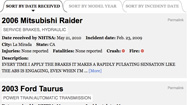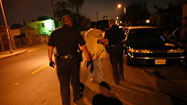Teacher responses to the 2010 release
The following is a list of teacher responses to their "value-added" ratings during the intial release in 2010. See the most recent responses »
The Times gave LAUSD elementary school teachers rated in this database the opportunity to preview their value-added evaluations and publicly respond. Some issues raised by teachers may be addressed in the FAQ. Teachers who have not commented may do so by contacting The Times.
|
|
 Delicious
Delicious
|
 Digg
Digg
|
 Facebook
Facebook
|
 Twitter
Twitter
|





Being effective to students should take more than just test scores. If an infant hasn’t mastered learning to walk by age one, does that mean he has ineffective parents? In contrast, a child who is walking by age one has very effective parents? My point is that to take test scores to measure a teacher’s effectiveness (good or bad) is unjust. The many hours of planned instructions that went on in the classroom throughout the school year fade away in the background and disregarded, even though they were effective at the time. Also, there is a difficulty of raising scores that were already high. It is harder to raise scores for our gifted students than others at the same grade level. And what about students who do reach a perfect score of 600? Haven’t they been the product of effective teaching?
August 17, 2010 at 1:21 p.m.
A values-added measure is one of many instruments that can be used to assess teacher effectiveness. Observation, the daily interaction of student with teacher, and the mastery of curriculum in spite of second-language barriers, all play a part in student achievement.
August 17, 2010 at 12:56 p.m.
I've never been referred to as an average teacher before, but it's interesting to know where I stand. Academic achievement is very important but so is attitude. My specialty has always been increasing self-esteem while motivating students to develop a love of school and learning. I want students to want to come to school. Too bad there's not a way to measure that.
August 17, 2010 at 12:51 p.m.
This I feel is a very unfair reflection on some of us. This is a second career for me and the hardest but most rewarding job I have ever done. During the years of this study I changed grade levels going from 4th to 3rd. That means learning a new curriculum. The following year I had a student that needed a special day class and was finally expelled from our school that January. That next year I taught 1/2 the year taking a Coordinator position and was out of the classroom from then on. The prior years scores are a better reflection of my teaching abilities as demonstrated by the test scores prior to 2004 and the comments from my former students and their parents.
August 17, 2010 at 12:35 p.m.
The first year you colected data for in 2002 was the year we started
Open Court 2002, the fifth different reading program we had in the past five years at my school. It was at the time when the STAR test was coming in.
Don't put too much faith in the data from that time.
Why are you putting all this pressure on teachers with your publishing test scores and threating us with takeover by Charter schools?
You are talking out of both sides of your mouth by telling us how lacking we are in our teaching skills and at the same time telling us how important we are to public education.
I know we are easy targets. If you put half the energy you use in going after teachers and appy it to parents, administrators, and students,
we would be much further along in improving education in LAUSD.
August 17, 2010 at 12:27 p.m.
The Times and our education policymakers have exhibited that they possess nothing more than a mere cursory understanding of the purpose of education. This current focus on teacher effectiveness with its sole emphasis on standardized test scores is based on the assumption that all teachers adhere to the same educational philosophy known as essentialism. Basically, this philosophy states that an educator’s purpose is to teach students the essentials (reading, ‘riting and ‘rithmetic) so that they will eventually be able to go out and get a good job to compete in the global economy. LAUSD often refers to this as “Career Bound and College Ready.”
I am not an essentialist. Rather, I align my classroom efforts with the philosophies known as critical pedagogy and holistic education. Therefore, my primary responsibilities are to foster social justice and equity by empowering my students to transform and improve the social and economic world through individual and group action; to nurture the development of the whole person to promote the self-actualization of all individuals; and to enable students to recognize the principles, patterns and processes found in sustainable ecosystems and to apply those designs toward the creation of healthy communities living in an interdependent, natural world.
What all of this means is that my students’ standardized test scores are somewhere near the bottom of my many concerns. Instead, I place much more value on the results of the authentic, real-life, project-based assessments that are regularly implemented in my classroom. In other words, meaningful work that my students actually generate! I believe the interests of my students would be much better served if the Los Angeles Times were to publish the results of my students’ expository and persuasive essays, research reports, narratives, science projects, presentations, student led discussions, lists of novels read, artwork, songs, poems, skits, etc. When I look at my students’ standardized tests, all I see is a scantron sheet full of darkened bubbles.
I, for one, am focused on the subjective experience my students will have, and what kind of self-reliant person they will become, as they develop a meaningful relationship with me throughout the course of the year. And I will never lower my standards to simply address the shallow, dehumanizing, “objective measurables” which our misguided education policymakers have determined that I am to be held accountable.
August 17, 2010 at 12:25 p.m.
Thank you for the opportunity to view my effectiveness as a teacher based on the "value-added" formula. I must admit I was a bit nervous to check my rating, but recognize my hard work and belief that all students can achieve must have an impact on student performance. This approach is a way to tackle the seemingly unfair evaluation process where most all teachers are basically viewed as "meets standards" for the teaching profession. Many teachers go above and beyond the expectation, work hard to differentiate their instruction to meet the needs of all their students. I believe that "if you teach it, students will learn and recognizing the it is not only what you teach, but how you teach that makes the difference.
August 17, 2010 at 11:56 a.m.
There are many factors that impact students' academic performance. Teacher quality and effective instruction are just two underlying factors. My school has had 13 different assistant principals within the past 7 years. Student transiency rate is high. I don't believe that publishing teacher's effectiveness in comparison to other teachers in the district is fair and meaningful. By doing this, you are influencing teachers to cheat on the state standardized test. Teachers are most effective when they evaluate data to drive their instruction, collaborate in professional learning communities, and are content with their working conditions. I don't see any value in ranking my teaching effectiveness based solely on my students' test scores.
August 17, 2010 at 11:46 a.m.
Can't wait for Yahoo Sports to create a fantasy teacher league. I wonder where I'll go in people's drafts.
August 17, 2010 at 11:32 a.m.
I think that teachers should be evaluated and I agree that some teachers are more effective than others. But to base effectiveness solely on test scores puts too much emphasis on something that is really just one of the tools teachers use to improve instruction. Evaluating teachers in this way will only lead to teachers teaching to a test rather than a classroom of children.
I teach at a high performing school. The students who come into my classroom have excellent test scores - proficient and advanced. Some even have perfect scores of 600. So, if those students maintain their perfect scores, that makes me an average teacher because they didn't improve. But if they miss one and score 580, or two and score 560... I'm considered less effective!
My responsibility is to the whole child, not a test. My goal is to produce healthy, well-equipped students who are good problem solvers in the classroom and on the yard. In addition to our rigorous curriculum of reading and math, it is also my responsibility to teach art, drama, physical education, computers, health, social studies, and science. I strive to bring the curriculum to life and provide opportunities for students to explore visual, auditory, and kinesthetic learning. However, my first and foremost responsibility as a teacher is to foster the love of learning. As a result, I have a positive, hardworking, successful classroom filled with students who want to be there and enjoy learning.
I'm afraid this article will just discourage teachers who put their heart and soul into their job while facing increasing class sizes, limited professional development, and diminishing resources.
August 17, 2010 at 11:25 a.m.